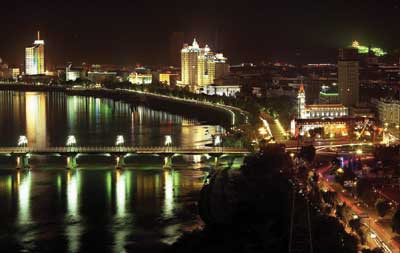| City, River, Bridge And Church |
| http://www.sina.com.cn 2004/02/25 09:19 中国周刊 |
Known as Kirin during the Manchukuo period in the earlier part of the 20th century, Jilin City is a pleasant little place with some delightful sights, great winter sports at affordable prices and the most convenient jumping-off point for Mount Changbai in summer. The city is divided in two by the Songhua River, with the downtown area spread along the riversides. A new promenade along the river was finished in 1998, making for a pretty walk, especially in winter, when the trees are coated in frost. This phenomenon, known as Wu Song or Shu Gua in Chinese, is the result of condensation from the city's hydroelectric dam at Songhua Lake, southeast of town. It's Jilin's claim to fame, along with an ice festival in January and three neighbouring skiing and sledding parks. This makes winter the ideal time to visit Jilin, though its parks - Beishan, Jiangnan and Jiangbei - are said to be nice also in summer. The best known of the three, Beishan Park, is in the west of town. It's filled with pathways and temples, the most interesting of which is Yuhuangge (Jade Emperor's Temple), where rows of fortune tellers gather out front.
There is also a bridge called Linjiangmen (meaning "city gate beside the river") Bridge. With the bridge, the scenic area along the Songhua River becomes more beautiful. Jilin's prettiest building and a reminder of the town's past, the Catholic church, was built in the 1920s by German missionaries beside the Jinlin Bridge, facing the Songhua River. There are occasionally Catholic weddings held in the church. Next door is a hospice for the elderly, which explains why the median age of a Jilin Catholic appears to be 80. Go there by train from Beijing West railway station T271 at 18:40. It arrives 11 hours later. |
| 【英语学习论坛】【评论】【大 中 小】【打印】【关闭】 |

